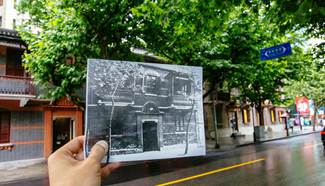by Osama Radi, Saud Abu Ramadan
GAZA, June 15 (Xinhua) -- Before daybreak during Ramadan, Mohamed Zaqout sings with his lovely voice several popular religious hymns to awaken sleeping Muslims so they could eat the last meal before starting their daylong fast.
The person undertaking this job is called a Musaharati.
The Musaharati typically walks around in neighborhoods while drumming and singing beautiful religious songs in the total darkness and silence of the night to awaken Muslims for their meal as well as the predawn prayer.
"Despite the developing times and technology, the Musaharati's job is a traditional one with a historical flavor," said Zaqout, 24, adding that he has been a Musaharati for the past seven years during Ramadan.
He wanders around in Gaza city's streets and allies while drumming and singing hymns with his lovely voice.
As people wake up and start preparing their meals, the children go down to take pictures with the Musaharati.
"I like the month of Ramadan very much," said Zaqout, adding, "I have done this job voluntarily every year for the last seven years and people enjoy it in this neighborhood and like me and my voice. It is an old tradition not exclusive to Gaza but can also be found in all Arab and Islamic countries."
Muslims worldwide usually fast 30 days during the year in the holy month of Ramadan, starting their fast from predawn and ending it at sunset.
They usually don't eat or drink nor smoke, and the wealthy members of society help the poor via donations of money or food. Most people also tend to spend their time in mosques praying and reading Quranic verses.
Zaqout usually leaves his house at 2:00 a.m. and begins walking around the neighborhood with his small drum. It takes him an hour and a half to wake people up, then before the Imam announces the start of the fast, he returns home and eats his meal before beginning his fast as well.
Technology has impacted tradition however, he said, adding "Often I'm surprised to find people still awake either watching television or chatting with friends on social media."
One of Zaqout's beautiful sentences which he uses to wake people up is, "wake up sleepers, Ramadan Kareem. Wake up and eat your meal and pray because Ramadan is here."
The Musaharati usually calls on people's names who have asked him for this service to wake them up.
However, being a Musaharati is not Zaqout's permanent job.
Throughout the rest of the year, he works in construction, and voluntarily becomes a Musaharati in Ramadan.
He likes what he does as he develops good ties with people during Ramadan.
Towards the end of Ramadan, mainly during the morning of the feast following Ramadan, Musaharatis take their drums and knock on doors to receive their financial compensation.
"This job is not profitable, but it is a temporary job through which Musaharatis can earn a humble living," said Zaqout, adding that living conditions in the Gaza Strip have become extremely difficult since the Israeli blockade imposed on the coastal enclave in 2006 which was then further tightened in 2007.
Zaqout's younger brother also helps him whilst studying at a university in Gaza. Both brothers become Musaharatis during Ramadan, and meet many people who usually offer them food, desert or a drink, as they both sing and delightfully wake Muslims up in order to start their fast.
Mohamed Sa'idi, 59, a resident of Gaza City who likes the Musaharati's job, says that whenever he hears both brothers coming into the neighborhood, he goes down with his four children to serve them with drinks, deserts and food.
Mohamed Nasman, in his mid-30s, said, "Ramadan has its traditions, and a Ramadan without a Musaharati is not the same," adding that, "usually, Musaharatis sing religious songs as well as songs which express the difficult Palestinian political and social situation."










